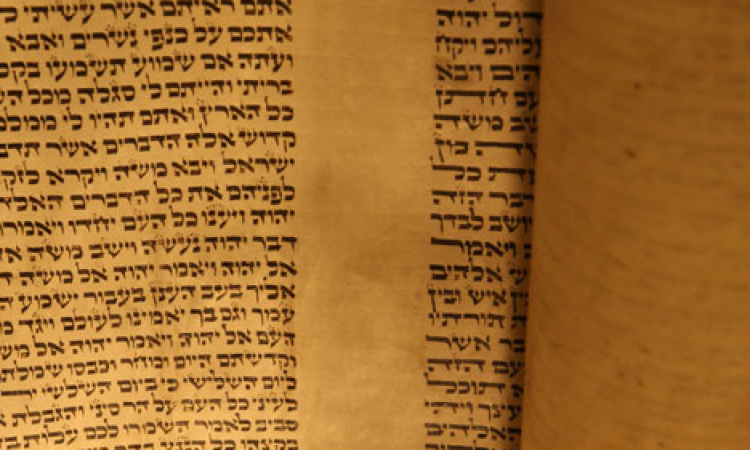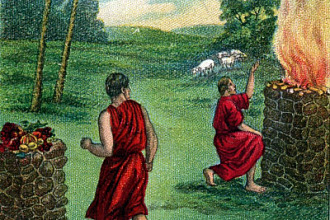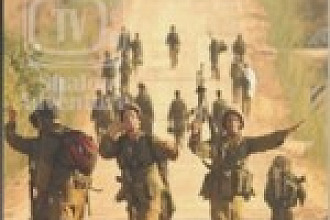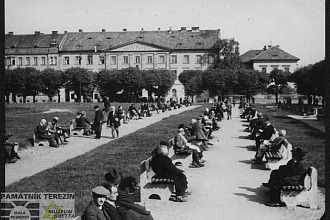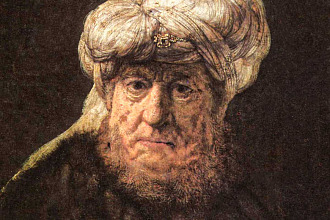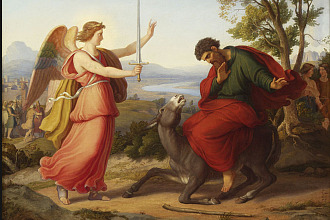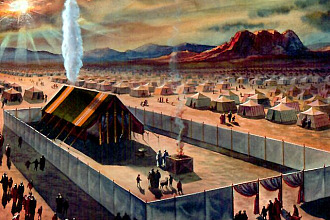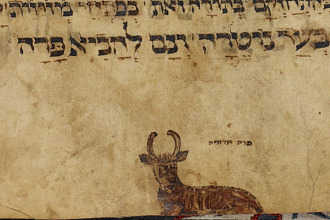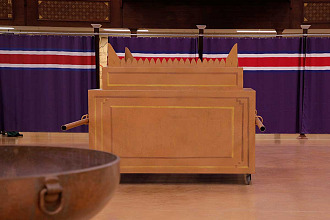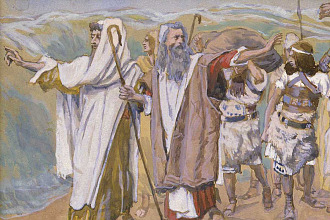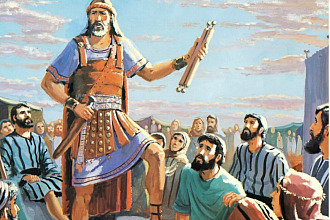Parasha for the Week: Toldot Genesis 25:19 – 28:9
Haftarah for the Week: Malachi 1:1 – 2:7
Besorat Yeshua: Mark 11:15 - 25
Overview
After 20 years of marriage, Yitzchak’s prayers are answered, and Rivka conceives twins. The pregnancy is extremely painful. G-d reveals to Rivka that the suffering is a microcosmic prelude to the worldwide conflict that will rage between the two great nations descended from these twins.
According to the Jewish tradition Eisav represents “Rome” and ultimately the “Goyim” or “nations” and Yaakov represents Israel.
Eisav is born, and then Yaakov, holding onto Eisav’s heel. They grow and Eisav becomes a hunter, a man of the physical world, whereas Yaakov sits in the tents of Torah developing his spiritual life. On the day of their grandfather Avraham’s funeral, Yaakov is cooking lentils, the traditional mourner’s meal. Eisav rushes in, ravenous from a hard days hunting, and sells his birthright (and its concomitant spiritual responsibilities) for a bowl of lentils, demonstrating his unworthiness for the position of firstborn.
A famine strikes Canaan and Yitzchak thinks of escaping to Egypt, but G-d tells him that because he was bound as a sacrifice, he has become holy and must remain in the Holy Land. He relocates to Gerar in the land of the Philistines, where, to protect Rivka, he has to say she is his sister.
The Philistines grow jealous of Yitzchak when he becomes immensely wealthy, and Avimelech the king asks him to leave.
Yitzchak re-digs three wells dug by his father. Avimelech, seeing that Yitzchak is blessed by G-d, makes a treaty with him.
When Yitzchak senses his end approaching, he summons Eisav to give him his blessings. Rivka, acting on a prophetic command that the blessings must go to Yaakov, arranges for Yaakov to impersonate Eisav and receive the blessings.
When Eisav in frustration reveals to his father that Yaakov has bought the birthright, Yitzchak realizes that the birthright has been bestowed correctly on Yaakov and confirms the blessings he has given Yaakov.
Eisav vows to kill Yaakov, so Rivka sends Yaakov to her brother Lavan where he may find a suitable wife.
"A Wrong Appetite"
The Torah states: “Now Yaacov cooked a stew. When Esav came in from the field, he was exhausted, so Esav said to Yaacov, ‘Please feed me some of this really red stuff, because I’m exhausted’—that is why he is called Edom.” (Genesis 25:29–30) Esav came back exhausted from hunting, when he saw the “red” pottage that Yaacov prepared he was attracted by it. Rabbi Hirsch says: the color attracts him no less than the dish itself. The color reminds him of the blood of a dying animal, which delights his eye when his arrow has found its mark. “Give me quickly some of that lovely red stuff” Later, he still boasts of this characteristic expression and calls himself “Edom” (the red one).
"G-d’s Promise to Yitzchak"
The Torah states: “Now there was a famine in the land—aside from the previous famine that happened in Avraham’s days. So Yitzchak went to King Abimelech of the Philistines, to Gerar.” (Genesis 26:1). The land of Israel is a difficult land, we can live comfortably in this land only if the blessings of G-d is upon it. Living for 15 years in Israel we have seen the challenges, it rains in Israel only from October to March, and during that period it rains only for an average of 50 days a year. There is no rain from Pesach (April) to Succoth (October). Without a wise management of its water resource, the land experiments strong famine, there was a famine in the time of Avraham, another one during the time of Yitzchak, and there will be another famine in the time of Yoseph/Yaacov, that means the land of Canaan knew one famine for each generation.
Hashem promised to Avraham and his descendants a country that can only be managed when it is blessed by G-d.
The same land that was destined to be overflowing with milk and honey was promised to Avraham for his ultimate possession. A very strange gift! a land without any natural resource, a land where there is a famine every thirty or forty years. The productivity of this land does not depend only on man’s labors and nature’s favors, but first and foremost, on the morality and integrity of its inhabitants. “If you defile it, the land will vomit you out as it vomited out the nation that was before you.” (Leviticus 18:28). The land was hard and unfruitful, subject to famine, and only through the power of the Torah did it become a land of abundance and blessing.
"A New Famine"
Let's remember that when Avraham saw a famine in the land, he went down to Egypt. His wife was kidnapped by Pharaoh who wanted to marry her. It was really not a positive experience for Avraham and Sarah.
This time, when Yitzchak suffered from a famine, G-d said to Yitzchak to stay in Canaan. It was important for Yitzchak and Rivkah to experiment G-d’s blessings, Hashem said to Yitzchak: “Then Hashem appeared to him and said, ‘Do not go down to Egypt. Dwell in the land about which I tell you. Live as an outsider in this land and I will be with you and bless you—for to you and to your seed I give all these lands—and I will confirm my pledge that I swore to Avraham your father. I will multiply your seed like the stars of the sky and I will give your seed all these lands. And in your seed all the nations of the earth will continually be blessed, because Avraham listened to My voice and kept My charge, My mitzvot, My decrees, and My instructions.’ So Yitzchak stayed in Gerar.” (Genesis 26:2–5).
Egypt was full of food, that is why Yitzchak intended to go down to Egypt during the famine. It was an usual place of refuge from famine. Even though the land of Israel is full of rock and a difficult place where to live, the people of Israel consider it as a treasured possession.
Jews have three treasures, Hashem, the Torah and the Land. The land and the Torah have been entrusted to Israel by G-d. They have been appointed to keep the Torah and to guard the land, to use it in accordance with the Will of the heavenly Owner, but Israel have no right to do with it as they please.
HAFTARAH Malachi 1:1 – 2:7
The prophet Malachi prophesied during the Second Temple period and was a contemporary of the prophets Haggai and Zechariah. Even though the time of his prophecy is unclear, the Jewish tradition affirms that he was the very last prophet of the Tanakh.
It is interesting that the Talmud identify Malachi with Mordechai (Esther’ uncle), but other identify Malachi to Ezra since they have some similarities in their prophecies about foreign marriage for example (Malachi 2:11 and Ezra 10:2), but we prefer the opinion of Radak and Abarbanel who affirm that Malachi was not Ezra but an individual named Malachi who prophesied at that time.
The prophecy starts saying: “An oracle: The word of Hashem to Israel by Malachi” (1:1), it is clear that even though this first verse says that this prophecy is addressed to Israel, the prophecy is referring directly to the people of Judah, since the ten tribes of the Northern kingdom of Israel did not exist anymore. They were exiled by the Assyrians, in the 8th century before Yeshua.
The next verse make the link between this Haftarah and the parasha for this week. In Parasha Toldot, we have the birth of Yaakov and Esav, their differences and conflict. The prophet confirms that the covenant made with Avraham and Isaac goes to Yaakov and not to Esav: “I loved you,” says Hashem. But you say: ‘How have you loved us?’ ‘Was Esav not Yaakov’s brother?’ —it is the declaration of Hashem— ‘Yet I loved Yaakov and Esav I hated’.” (Malachi 1:2–3). This verse is here again to teach us how much G-d loves Israel. The Jewish people are people full of sin, she has been punished by G-d, but this punishment is from a father who love his child. The prophet speaks on behalf of the people of Israel and asks “How have you loved us?” Israel knew that G-d loved the patriarchs and their ancestors, but they wanted a confirmation of his love for this generation. Hashem answers this question by a first question: “Was Esav not Yaakov’s brother?” Yes of course Esav was the brother of Yaakov, they were almost twins, but the blessings of God were more upon Yaakov and his descendants than on Esav, and God continues saying: “Yet I loved Yaakov and Esav I hated.” The text is saying how the land given to the descendants of Esav will stay a desert: “I made his hills a wasteland and gave his inheritance to jackals of the wilderness.” (Malachi 1:3). The land given to Esav is the Eastern part of the Jordan River, which is until today a difficult land full of desert. Israel has always respected their brothers descendants of Esav, the Torah said to Israel: “You are not to detest an Edomite, for he is your brother.” (Deuteronomy 23:8).
Besorat Yeshua Mark 11:14 - 25
Parashat Toldot is about the story of Isaac and Rivka, the second generation of the patriarchs giving birth to Yaakov and Esau, the third generation of the patriarchs. These two brothers are very different from one another, exactly like Abraham was different of his brothers and Isaac was different of Ishmael his brother. While Yaakov is a good boy (Ish Tam), interested by spiritual things, —meditation on the divine promises, studying G-d’s Word in the tent of Abraham. Esau, on the opposite was not interested by spirituality but only hunting and girls. Later he will demonstrate also a great interest on possessions. For him the birthrights was about money, the fortune of his father and grand-father.
And even though he wanted to kill his brother, he did not do it when he understood that his brother Yaakov had his own richness and will not try to ask his part of the inheritance.
In the Besorah (gospel) of Mark we have these two brothers symbolized by Yeshua and the Merchants of the Temple. Yeshua as the Messiah is only interested by spiritual matter, accomplishing the mitzvot of the Torah, praying, meditating, teaching the will of his father who is in heaven, and on the other side we have the merchants who are much more interested by the profit of their businesses.
A strong parallel of the story of these two brothers, as Yaakov was shocked by the behavior of Esau and knew that his brother was not spiritual, did not deserve the first born’s rights. Parallel with Yeshua who entered the temple and was shocked by what he saw: “Then they came to Jerusalem. And he entered the temple and began to drive out those who were selling and those who were buying in the temple, and he overturned the tables of the money changers and the seats of those who sold dove” (Mark 11:15). Selling doves was not bad business, the pilgrims who came from fare needed these animals for the sacrifice and spiritual devotions, but this spiritual meaning was lost by the merchants, they only saw the money and profit they could make. Yeshua and Yaakov had a similar character, we remember what the Torah said about Yaakov: “Yaakov was a mild man [Ish Tam] (integer and blameless) man, living in tents.” (Genesis 25:27). —we are sorry that the translation does not gives back the real meaning of Ish Tam. In the same way, Yeshua was a man of prayer and meditation, studying the Tanakh, if the gospels were written in Hebrew he would have been described as a Ish Tam too. Both, Yaakov and Yeshua, are hurt by the lack of spirituality of the people of their time. That is why in the besorah, Yeshua tried to teach these people, reminding them the first purpose of the Temple, which is and should be first of all a house of prayers for all nations: “And he was teaching them and saying to them, “Is it not written, ‘My house shall be called a house of prayer for all the nations’? ‘But you have made it a den of robbers.’” (Mark 11:17). We have to be very careful how we interpret the Bible and the Gospel. Many interpreters have used this words to qualify all the Jews as robbers and thieves. Yeshua could express himself in this way, because he was moved by a great love for his people, and only some merchants were robbers, we cannot generalize, if we do it, this is assimilated to racism and antisemitism.
Another parallel can be found between other characters of this story, because Rivka was a great woman, who has fully accepted the destiny of Abraham and his clan, she has accepted the promises of God and trusted Abraham in everything he taught her. She is a lady full of faith in God’s promises. Her faith helped her to understand, that these promises would be in danger in the hand of Esau, and trusted more Yaakov. She knows that he is a spiritual man. That is why she was prepared to do everything for Yaakov. She ordered to him: “Now therefore, my son, obey my word as I command you.” (Gen. 27:8). The parallel can be made with Yeshua who was on earth a man of faith, a man who knew what would be the future of his people and who invited his disciples to have faith: “Yeshua answered them, “Have faith in G-d” (Mark 11:22). Esau was not happy that the blessing was given to Yaakov, for him what happened was not fair and wanted to kill his brother, he completely forgot that it was him who renounced to his first born rights. The text of the parasha says: “Now Esau hated Jacob … I will kill my brother Jacob.” (Gen. 27:41). The parallel character here are the leaders who wanted to kill Yeshua. Their jealousy and misunderstanding gave a wrong conclusion to the leaders of the people of Israel of that time, their intentions were revealed: “And the chief priests and the scribes heard it and were seeking a way to destroy him, for they feared him” (Mark 11:18). They wanted to kill Yeshua, but they could not because the crowd believed in him: “all the crowd was astonished at his teaching.” (Mark 11:18). What is our attitude towards Yeshua’s teaching, are we ready to be surprised by His wisdom and to accept His teaching as it was accepted by thousand of Jews in his time?

